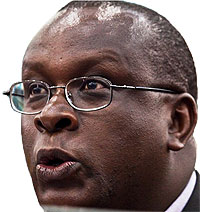Denial is the last phase of every genocide. After the physical extermination, comes the attempt to revise history and erase the memory of the victims.


Denial is the last phase of every genocide. After the physical extermination, comes the attempt to revise history and erase the memory of the victims.
Genocide in its very definition, requires systematic planning. It begins with classification, dehumanisation and polarisation followed by preparation, persecution and extermination. It always ends with the last stage of denial.
Denial is never done out of ignorance; to deny facts as obvious as the attempted extermination of a people, requires premeditation and persistence. Some outrightly deny, others play the double genocide card, everyone killed, everyone died, let’s call it even.
Let us be clear, in Rwanda, there was only one genocide: The Genocide against the Tutsi. The literature, the radio and video content showing the killing, the accounts of those who were marked to be killed but survived and the over one million victims are all undeniable reminders that for 100 days, the plan to exterminate the Tutsi was carefully and systematically executed.
Despite these facts, on December 9, 2013, Vatican radio published a radio interview with Catholic NGO Caritas Switzerland, a Vatican affiliated association with 146 chapters around the world. The interview asserted that the government of Rwanda pushes a one sided genocide narrative, criminalising those who disagree with this version.
In this interview, the very same organisation that claims to work to promote justice and restore dignity had reduced the Genocide Against the Tutsi to government propaganda.
One has to wonder what Caritas means by one sided narrative.Should we exclude the Security Council of the United Nations in its resolution 2136 (2014) which states, "…recalling that the FDLR is a group under United Nations sanctions whose leaders and members include perpetrators of the 1994 genocide against the Tutsi in Rwanda, during which Hutu and others who opposed the genocide were also killed…”
Did they mean that the judicial definition established by the International Criminal Tribunal for Rwanda in all of its 70 judgments was simply misguided?
Beyond Denial
Denying the Genocide against the Tutsi, is never a disinterested act- it is a tool to deny ones’ own responsibility.
Caritas, as an organisation, was an active supporter of the regime that planned and executed the genocide.
Before the genocide, $725,669 was diverted from foreign aid to purchase five hundred thousand machetes.
Among these machetes, 816 were purchased by special order for Caritas Rwanda on 5 August, 1993, from a local company in Kigali, RWANDEX - Shillington.
These machetes were distributed to all parishes of the Catholic Church in Rwanda. It was these machetes that were used to slaughter Tutsi priests including Joseph Niyomugabo, killed in his parish in Cyanika.
But Caritas responsibility went beyond the purchase of tools for mass murder. In June 1994, Madeleine Raffin, a French citizen and director of Caritas Gikongoro in Rwanda, led two of her Tutsi employees to the diocese of Gikongoro and delivered them to the militia roadblock at Kabeza. The two were killed on the spot.
And when the regime Caritas supported was prevented from succeeding in wiping out Tutsi men, women and children, they made it possible for genocidaires including religious leaders to escape to Europe and Canada.
Once the killers were free, their victims dead or forever maimed, in 1995, the denial began. CaritasSwitzerland distributed a pamphlet to its donors in which they said that in 1994 the genocide was committed against Hutus.
In February 1998, Madelaine Raffin was expelled from Rwanda due to evidence of ethnic discrimination in the management of the diocesan Caritas.
Currently, she is active in the protection of genocidaires and those who claim the genocide never happened in France.
With these facts, it is not surprising that in November and then in December 2013, Caritas leaders arguing that the government of Rwanda (which they call double faced) was seeking to become "master of memory/history”.
Denial at its finest. The victims become the perpetrators,guilty of demanding justice for a crime the world chose to stand by and watch. The perpetrators have becomevictimswho must be protected and rewarded.
But no one can erase the blood stains in churches across Rwanda where hundred of thousands sought refuge only to fall victims at the hand of the church they believed in and no one can silence the voices of those who survived to tell their stories.
No one can erase the evidence of Genocide.
We must stand together to condemn revisionism of historical truth. We must honor the memory of our victims by standing up for truth, justice and against impunity.
Dr. Jean Damascene Bizimana is a Senator in Rwanda’s Parliament.


